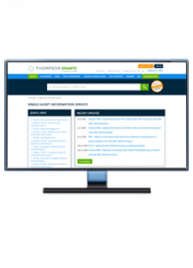Sneak Preview: GAO Report Promotes Potential Financial Benefits

(The following was excerpted from a recent Thompson Grants Compliance Expert article.) The Government Accountability Office (GAO), in a recent “open matters report,” urged Congress to respond to more than 200 currently unresolved GAO recommendations ― including those related to federal grant programs ― made since 2000 that GAO said could lead to billions of dollars in financial benefits.
The report notes that GAO has requested Congress to consider more than 1,100 matters for potential financial savings ― as well as improvements to other key concerns such as usage of energy, national defense and health ― over the last 24 years, and although Congress has acted on some 80% of these recommendations, 242 matters remained open as of this March.
“Actions by Congress on [these] matters can improve the effectiveness of federal agencies and programs, and help position the nation to address future challenges,” according to the open matters report, which GAO presents to Congress annually. “Congress can address these matters by passing legislation, [holding] hearings, and [using] its budget, appropriations and oversight processes to highlight these matters.”
The report specifically identified 30 open matters that could result in “measurable” financial benefits to the federal government if implemented. For example, GAO in a January 2008 report recommended that Congress require the Department of Health and Human Services to improve the Medicaid Section 1115 demonstration review process by taking steps such as clarifying the review criteria and the basis for approving states’ proposed spending limits. GAO anticipates that by doing so, the agency could save tens of billions of dollars or more.
Another open recommendation involving Medicaid calls for Congress to consider enacting a Federal Medical Assistance Percentage (FMAP) formula that is targeted for variable state Medicaid needs, and that provides automatic, timely and temporary increased FMAP assistance in response to national economic downturns.
Another recommendation urges Congress, as a way to improve the transparency of and accountability of Medicaid non-disproportionate share hospital (non-DSH) supplemental payments, to consider requiring the Centers for Medicare and Medicaid Services to: (1) improve state reporting of non-DSH supplemental payments, including requiring annual reporting of payments made to individual facilities and other information that the agency determines is necessary to oversee non-DSH supplemental payments; (2) clarify permissible methods for calculating non-DSH supplemental payments; and (3) require states to submit an annual independent certified audit verifying state compliance with permissible methods for calculating non-DSH supplemental payments.
(The full version of this story has now been made available to all for a limited time here.)
Join us for our following Thompson Grants events:
Thompson Grants Workshop: Audits | July 18, 2024 | Virtual Event
Federal Grants Forum State and Local Governments | Sept. 10-11, 2024 | Virtual Event



